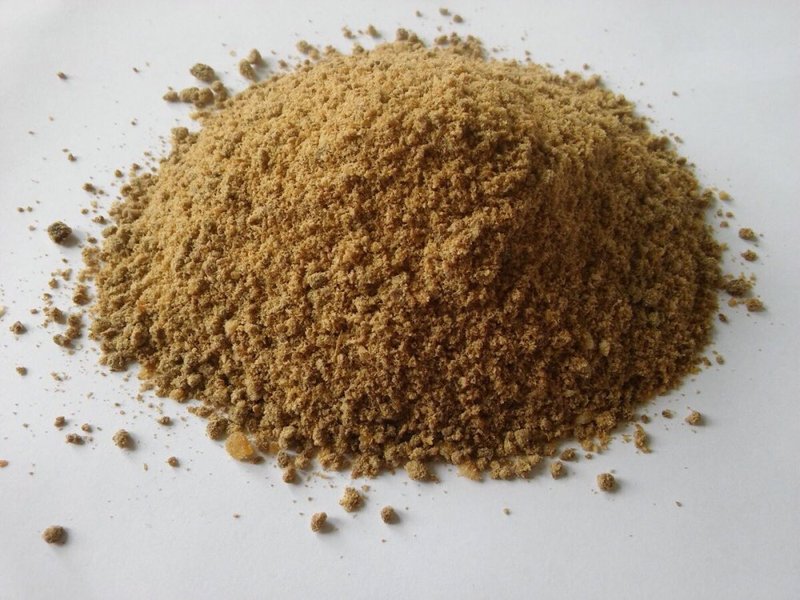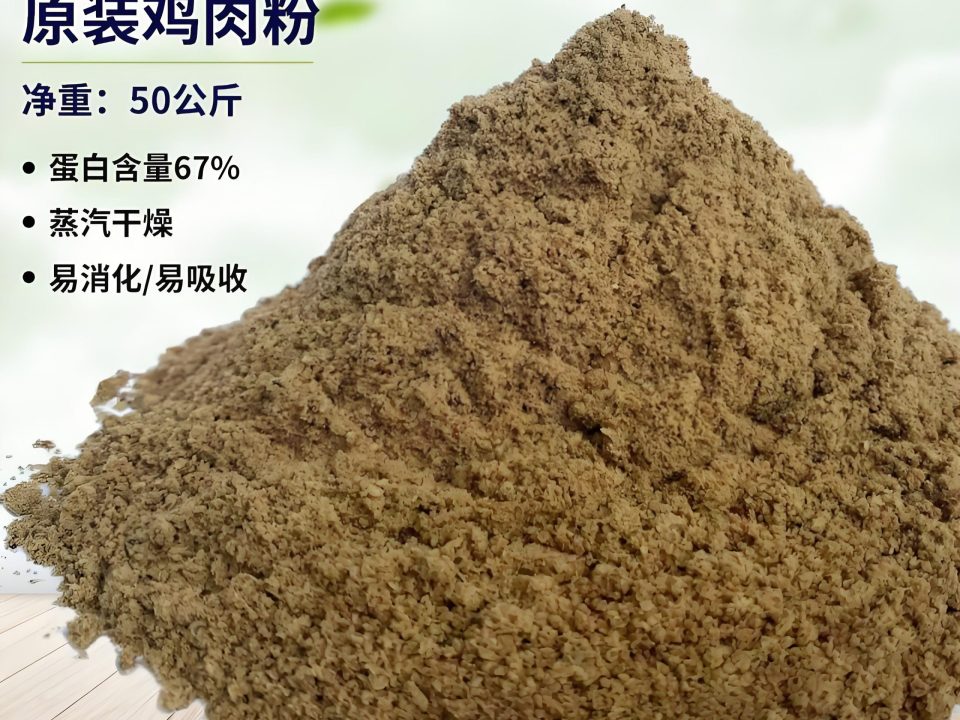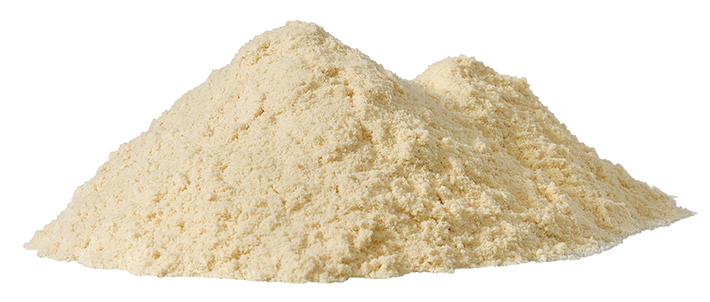Why is Chicken Meal Used in Dog Food ?

Growth and Cost-Benefit Analysis of Using Chicken Meal as Animal Feed
December 12, 2024
How Do Feed Additives Promote Growth in Animals?
December 24, 2024Why is Chicken Meal Used in Dog Food?
Chicken meal is a popular ingredient in many commercial dog food formulas due to its high nutritional value, digestibility, and beneficial effects on canine health. Unlike fresh chicken, which contains a high amount of water, chicken meal is a concentrated protein source that packs a lot of nutritional value into a smaller volume, making it an efficient and cost-effective choice for pet food manufacturers.
This section explores the specific reasons chicken meal is used in dog food, focusing on its nutritional benefits, digestibility, and role in supporting various aspects of canine health.
1. High-Quality Protein Source
1.1. Protein Content and Amino Acids
Chicken meal is made by cooking and dehydrating chicken meat, which concentrates its protein content. This process results in a product with 60-70% protein, much higher than that of fresh chicken, which contains a significant amount of water. Protein is one of the most crucial macronutrients for dogs because it helps in muscle growth, tissue repair, and overall bodily functions.
The protein in chicken meal is rich in essential amino acids, which are vital for the health of dogs. Some of the most important amino acids found in chicken meal include:
- Lysine: Aids in protein synthesis and is crucial for muscle repair and growth.
- Methionine: Supports healthy coat and skin, and plays a role in detoxification and fat metabolism.
- Threonine: Helps maintain the immune system and healthy digestive function.
- Cysteine: Contributes to the health of skin and hair follicles.
1.2. Muscle Maintenance and Growth
For growing puppies, adult dogs, and working dogs, chicken meal provides the necessary building blocks for muscle maintenance and growth. The amino acids found in chicken meal are essential for tissue repair, which is particularly important after exercise or injury. For older dogs or those with health issues, maintaining muscle mass is critical, and chicken meal provides a protein source that is both highly digestible and effective at supporting these needs.
2. Digestibility and Bioavailability
2.1. Highly Digestible Protein
Chicken meal is known for its high digestibility, meaning that a large proportion of the protein and nutrients are absorbed and utilized by the dog’s body. Dogs have relatively short digestive tracts compared to other animals, so digestibility is a key factor in choosing ingredients for dog food. When the protein in chicken meal is absorbed efficiently, it leads to better nutrient utilization, meaning that dogs can get more benefit from smaller amounts of food.
Dogs typically digest chicken meal at a higher rate compared to plant-based proteins, such as soy or corn, which may contain anti-nutritional factors that can hinder protein absorption. Therefore, using chicken meal in dog food helps ensure that dogs receive more of the nutritional benefits from their meals.
2.2. Consistent Quality and Nutritional Profile
Another benefit of chicken meal is that it offers a consistent nutritional profile. Unlike fresh chicken, the nutrient composition of chicken meal remains stable and predictable, making it easier for manufacturers to formulate balanced dog food. Chicken meal’s high protein content and amino acid profile are predictable, ensuring that each serving provides dogs with the right nutrients in the right amounts.
3. Suitable for Dogs with Food Sensitivities or Allergies
3.1. Hypoallergenic Properties
Chicken meal is often included in dog food recipes designed for dogs with food sensitivities or allergies. While some dogs are allergic to beef or lamb, chicken is less likely to cause an allergic reaction. Additionally, the dehydration process used to make chicken meal removes excess moisture and helps concentrate the nutrients, reducing the chances of contamination from bacteria or allergens that could arise from fresh meats.
The hypoallergenic nature of chicken meal makes it a good choice for dogs that suffer from skin issues, gastrointestinal problems, or food sensitivities. It is commonly used in “sensitive stomach” formulas, which are designed to be easy on a dog’s digestive system.
3.2. Easy on the Digestive System
Because chicken meal is highly digestible and contains no unnecessary water content, it is gentler on the digestive systems of dogs with sensitive stomachs. The protein in chicken meal is easier to break down and metabolize compared to other meats, making it an ideal option for dogs that struggle with digestion or have sensitive gastrointestinal systems.
4. Supports Healthy Skin and Coat
4.1. Omega Fatty Acids
Chicken meal is not only a rich source of protein, but it also contains beneficial fats, including omega-6 and omega-3 fatty acids. These healthy fats are essential for maintaining a shiny, healthy coat and supporting skin health. Omega-6 fatty acids help maintain the skin’s barrier function, reducing moisture loss and preventing dryness or flakiness. Omega-3s help to reduce inflammation and support the health of the skin and coat.
For dogs prone to skin allergies or dry, flaky skin, chicken meal provides a balanced fat profile that supports healthy skin and a glossy coat. The presence of omega-3 and omega-6 fatty acids is especially important for breeds with thicker coats or those that are more susceptible to skin conditions.
5. Rich in Essential Vitamins and Minerals
5.1. Vitamin B12 and Niacin
Chicken meal is a rich source of several essential vitamins, particularly B vitamins like Vitamin B12 and niacin (Vitamin B3), which are important for a dog’s metabolism and overall health. Vitamin B12 helps in maintaining a healthy nervous system, promoting energy production, and ensuring proper function of red blood cells. Niacin supports healthy skin and a well-functioning digestive system.
5.2. Zinc, Selenium, and Other Trace Minerals
In addition to vitamins, chicken meal also provides trace minerals like zinc, selenium, and iron, all of which are important for maintaining a healthy immune system and supporting overall bodily functions. Zinc is essential for skin health and wound healing, while selenium acts as an antioxidant, helping to protect the body from cellular damage.
These minerals play critical roles in various physiological functions, such as maintaining a strong immune system, supporting healthy cell function, and contributing to optimal metabolic processes. They are especially important for dogs with compromised immune systems or those that need additional support due to age or illness.
6. Cost-Effectiveness
6.1. Affordable Protein Source
One of the reasons chicken meal is commonly used in dog food is its affordability. Compared to premium meat-based protein sources such as lamb or venison, chicken meal is often more economical while still providing a comparable level of nutrition. Its affordability helps pet food manufacturers create high-quality, nutrient-dense dog food at a lower cost, which in turn benefits consumers by offering a more accessible price point for premium dog food.
6.2. Efficient Ingredient
Because chicken meal is highly concentrated, it provides a significant amount of protein and nutrients in a smaller volume, which means that it can be used in smaller quantities to achieve the desired nutritional profile. This efficiency helps manufacturers optimize ingredient costs while maintaining high nutritional standards.
7. Supports Overall Canine Health
7.1. Strengthens the Immune System
Chicken meal contains essential vitamins and minerals, such as Vitamin E, zinc, and selenium, that help support a dog’s immune system. These nutrients work together to protect the dog’s body from infections and diseases, enhancing overall health and longevity.
7.2. Joint and Bone Health
The amino acids in chicken meal are also beneficial for joint and bone health. For growing puppies, chicken meal supports proper skeletal development. In older dogs, these nutrients help maintain bone density and joint mobility, which is essential for preventing conditions like arthritis and joint degeneration.
Conclusion
Chicken meal is a highly nutritious, digestible, and cost-effective ingredient that offers numerous benefits for dogs. It provides high-quality protein, essential amino acids, and healthy fats, which support growth, muscle maintenance, and overall health. Additionally, its hypoallergenic properties make it an excellent choice for dogs with food sensitivities or allergies, while its omega fatty acids support a healthy coat and skin. With its balanced nutrient profile, digestibility, and affordability, chicken meal remains one of the most popular and reliable protein sources in dog food formulations.
By including chicken meal in their dog food, pet food manufacturers can ensure that they provide a nutritious, high-quality meal that meets the dietary needs of dogs, while also offering significant health benefits that improve the overall well-being of canine companions.






